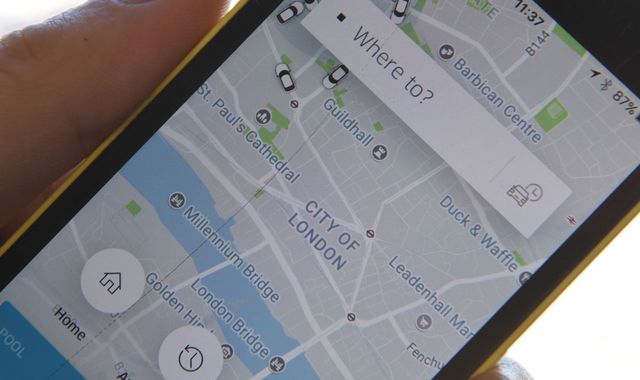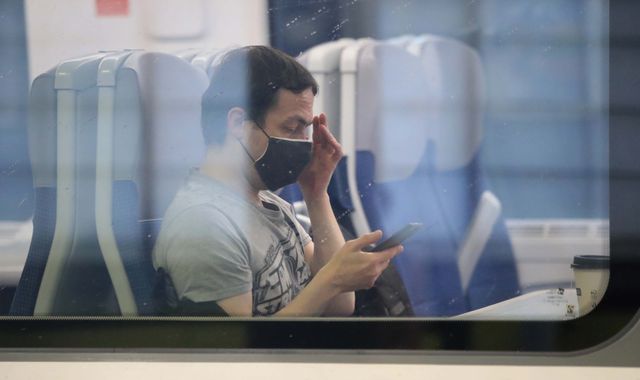Uber’s hopes go into reverse in new TfL battle for London licence
Written by News on 03/08/2019
Uber Technologies is facing an uphill struggle to secure a long-term licence from London’s transport regulator little more than a year after it was forced to go to court to overturn an outright ban.


Sky News has learnt that Uber, the world’s best-known ride-hailing service, is privately expecting its application for a permit from Transport for Licence (TfL) to result in the awarding of another short-term licence.
Industry sources said this weekend that New York-listed Uber had little chance of being granted the full five-year term when a probationary period expires towards the end of next month.
Instead, the company, which has a market value of $68.5bn (£56.3bn), is understood to be resigned to getting a further temporary extension of under two years.
Such a decision would be a blow to Uber, which is used by millions of Londoners and roughly 40,000 drivers in the capital.
London is among the technology company’s most lucrative markets in the world, and its most profitable outside the US.
One source said that a further 15-month or 18-month licence would underline the extent of the task facing Uber and its chief executive, Dara Khosrowshahi, as it seeks to persuade international regulators that it is a responsible corporate citizen.
“There is next to no chance that Uber will get a five-year licence in September,” said a person close to the company.
Insiders said there remained tensions between Uber and TfL over the app’s commitment to some of the 14 conditions set out by Westminster chief magistrate Emma Arbuthnot when she awarded the temporary licence in June 2018.
Mayor of London Sadiq Khan had endorsed TfL’s refusal to award a licence the previous autumn on the grounds that Uber was “not a fit and proper” operator in the London private-hire market.
In her judgement, Ms Arbuthnot said that the appointment of a trio of prominent businesspeople – including the media veteran Roger Parry – to its UK board represented an important step towards transforming its corporate governance.
However, she highlighted Uber’s refusal to accept blame for shortcomings in conducting criminal record checks on drivers and delays to informing regulators about data breaches as reasons for continuing concerns about its oversight.
Among the conditions set down in the ruling was that Uber: must demonstrate greater transparency in relation to regulatory probes; must not use software to evade investigations; and improve its criminal reporting and complaints-handling processes.
An Uber spokeswoman declined to comment on whether it had failed to meet, or breached, any of the 14 conditions.
Sources said that Uber’s application to renew its London licence had been submitted in the last month.
A decision from TfL is due to be made ahead of the expiry of the current term on 25 September.
One source close to the company claimed this week that a further 15-month licence “would not be a disaster” and pointed out that TfL had issued several permits of that duration this year, including to Ola and Viavan, although they acknowledged that these were first-time licensees in the capital.
The chances of Uber not being granted a licence at all next month were put as “highly unlikely” by the source.
A TfL spokesman declined to comment.
The former Ofcom chief executive, Ed Richards, who jointly runs consultancy Flint Global, is said to be continuing to advise Uber on regulatory affairs.
The legal battle over its London licence is not the only courtroom fight it has been involved in in Britain.
Earlier this year, it survived a High Court challenge brought by a group of black cab drivers who alleged that Ms Arbuthnot’s ruling had been “tainted by actual or apparent bias” because of financial connections between her husband and Uber.
Last month, Uber drivers lost a legal battle to avoid paying congestion charges in London.
Uber’s attempt to prolong its presence in London comes as it considers a takeover bid for Addison Lee, one of the capital’s biggest minicab operators.
Sky News revealed last week that both Uber and Ola had met Addison Lee executives recently to discuss a potential offer.
Sources close to Uber have said the chances of buying the company from Carlyle, its private equity backer, are remote.
Run by Andy Boland, its chief executive, Addison Lee has a fleet of about 5,000 cars in London and holds a roughly 10% share of the market, behind traditional black cabs and Uber.
The New York-listed company’s preliminary interest in Addison Lee is surprising because of the disparities in their business models.
Uber’s drivers are effectively self-employed and use their own vehicles, while Addison Lee either owns or leases its cars to drivers.
In an effort to improve its reputation, Uber has launched an environmentally focused campaign called its Clean Air Plan, which levies a 15p-per-ride fee on every trip booked through its app in London.
The company has said it expects the move to raise more than £200m “to support drivers transitioning to electric vehicles over the next few years”.
Uber’s New York Stock Exchange-listed shares closed on Friday at $40.40, more than 10% below the $45 at which they were priced in May’s flotation.
(c) Sky News 2019: Uber’s hopes go into reverse in new TfL battle for London licence







